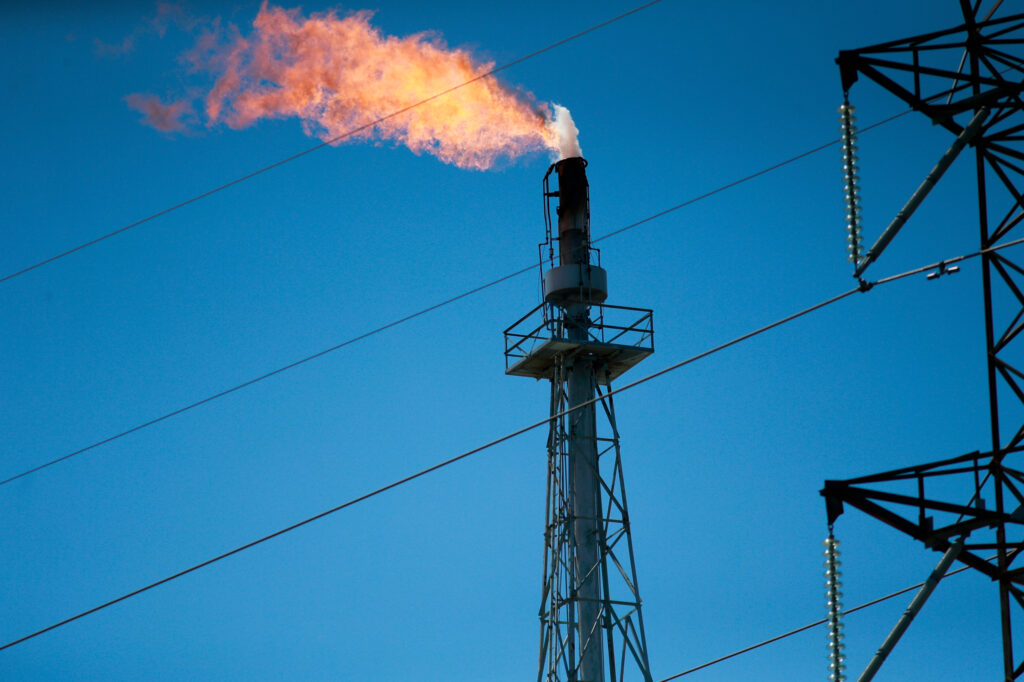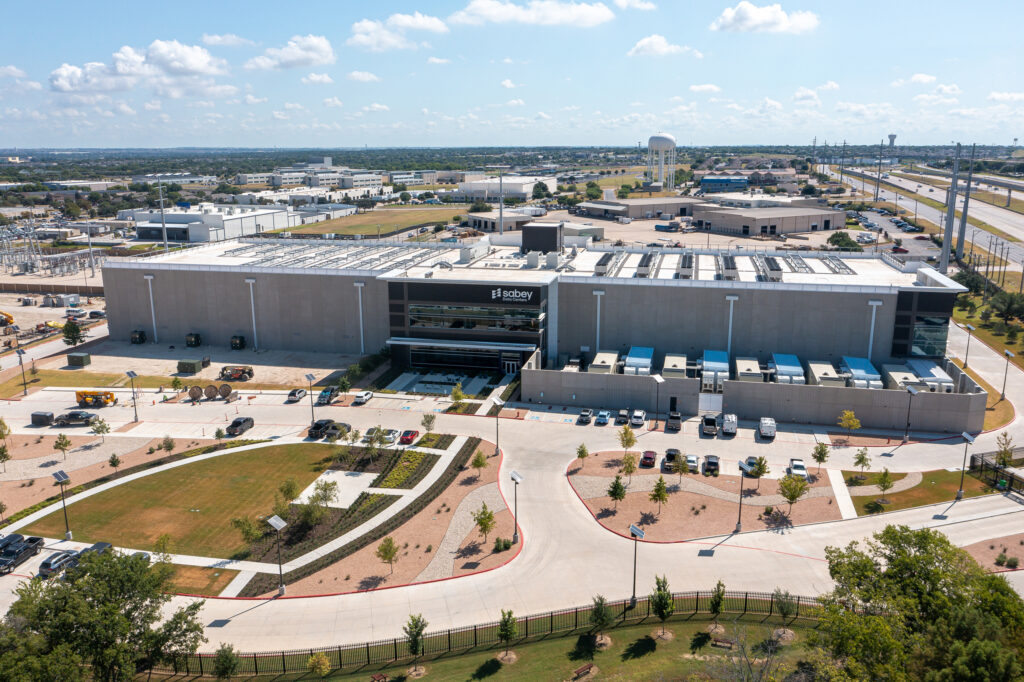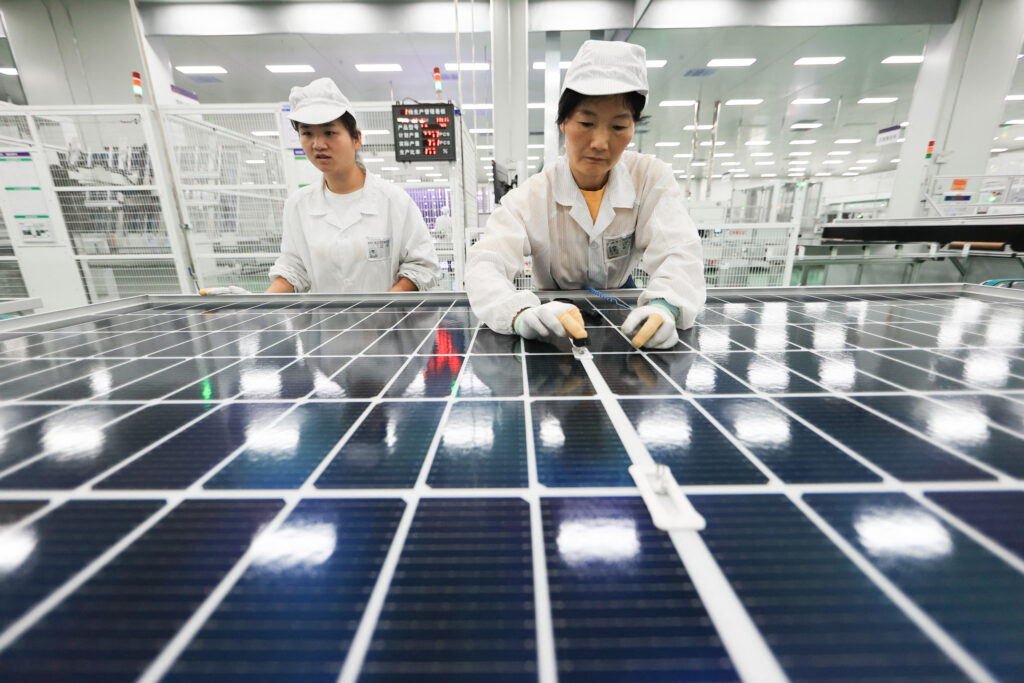RICHMOND, Va.—At an evening election rally focused on clean energy last month, a 26-year-old who’s studied environmental issues said his skyrocketing electric bills as a voting motivation are exceeded only by his dislike of President Donald Trump.
He and his partner recently moved from an apartment building in Richmond where their rent—which included utilities—increased by $800 a month. In a state with more energy-sucking data centers than any place on earth, he thought surging energy demand might have had something to do with the rent hike.
“I’ve never had it jump that high before,” said the angry voter, who said his first name was Jade and wouldn’t give his last name. Even at their new home, he said, “we stopped using our dryer.”
Ann Moore, who lives in rural Brunswick County, said the energy issue that really bothers her is an onslaught of solar projects being built on the farmland around her home. Even though solar has become the cheapest way to power those data centers, Moore’s disdain for solar farms—she calls the cost metric “misinformation”—has become a common refrain in rural, agricultural parts of the state.
“The footprint is just too great,” Moore said. “To go out and make a big deal about how CO2, we’ve got to do carbon capture and all those kinds of things … no. I think that that’s going overboard. Do we need to be good stewards of our planet, by all means. That doesn’t mean we shut out all [generation] possibilities.”
Energy production and energy consumption have become hot topics as Virginians head to the polls on Tuesday with the governor, lieutenant governor and all 100 seats in the House of Delegates, the lower house of the legislature, up for election. The Senate’s 40 seats aren’t up for election until 2027.
The other state with such a high-stakes election is New Jersey, with the governor’s office and all 80 seats in the heavily Democratic General Assembly, the lower house of the legislature, up for election.
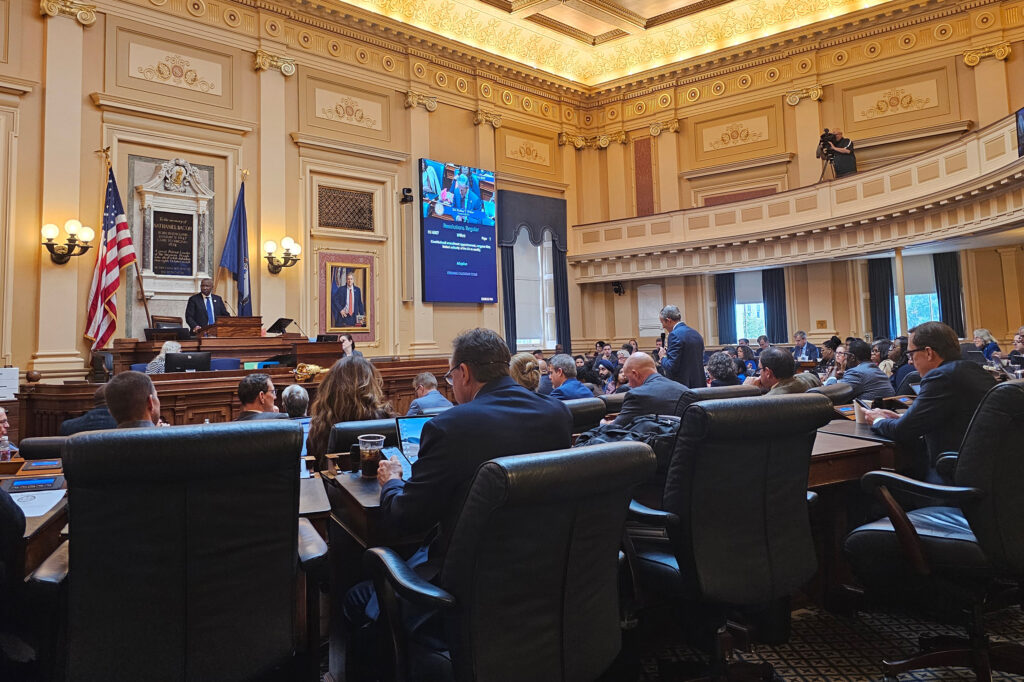
Democrat Abigail Spanberger, a former CIA officer and U.S. representative, is far ahead in the polls over Republican Winsome Earle-Sears, giving Democrats hope that the House’s current 51-48 Democratic majority will expand and the party will control the governor’s mansion and both houses of the legislature. Democrats hold a 21-19 majority in the Senate, while the state’s current governor, Glenn Youngkin, is a Republican.
Spanberger wants to address the climate crisis by building rooftop solar and other small solar projects, in tandem with battery storage systems to increase the reliability of renewables.
She’s accepted using existing natural gas energy sources amid rising energy demands but questioned the necessity of new fossil fuel investments. She has been backed by Clean Virginia, an advocacy group formed to counter Dominion Energy’s influence in the legislature. The utility is seeking to build more natural gas units; the company currently faces restrictions under state law on any fossil-fuel expansions.
Those restrictions are baked into the Virginia Clean Economy Act, a 2020 law Democrats passed to address climate change by requiring the state’s two largest utilities, Dominion and Appalachian Power, to decarbonize by mid-century.
In the years since, Democrats in the legislature have defeated Republican attempts to roll back the fossil fuel restrictions. They also expanded opportunities for small solar and battery storage projects, before Youngkin vetoed them.
There was bipartisan support, meanwhile, for legislation passed last year that had been sought by Dominion and Appalachian Power to grant them recovery of preconstruction costs for developing small modular nuclear reactors.
The debates on energy policy in Virginia have centered around how data center development should occur in the state and how much of the state’s energy mix should come from renewable energy sources.
“We’re willing to roll up our sleeves and work with lawmakers to find the best fix for how we make sure that customers are being treated fairly and that big corporations are paying their share of … the bills and the need for additional electricity in the grid,” said Mike Town, executive director of the Virginia League of Conservation Voters.
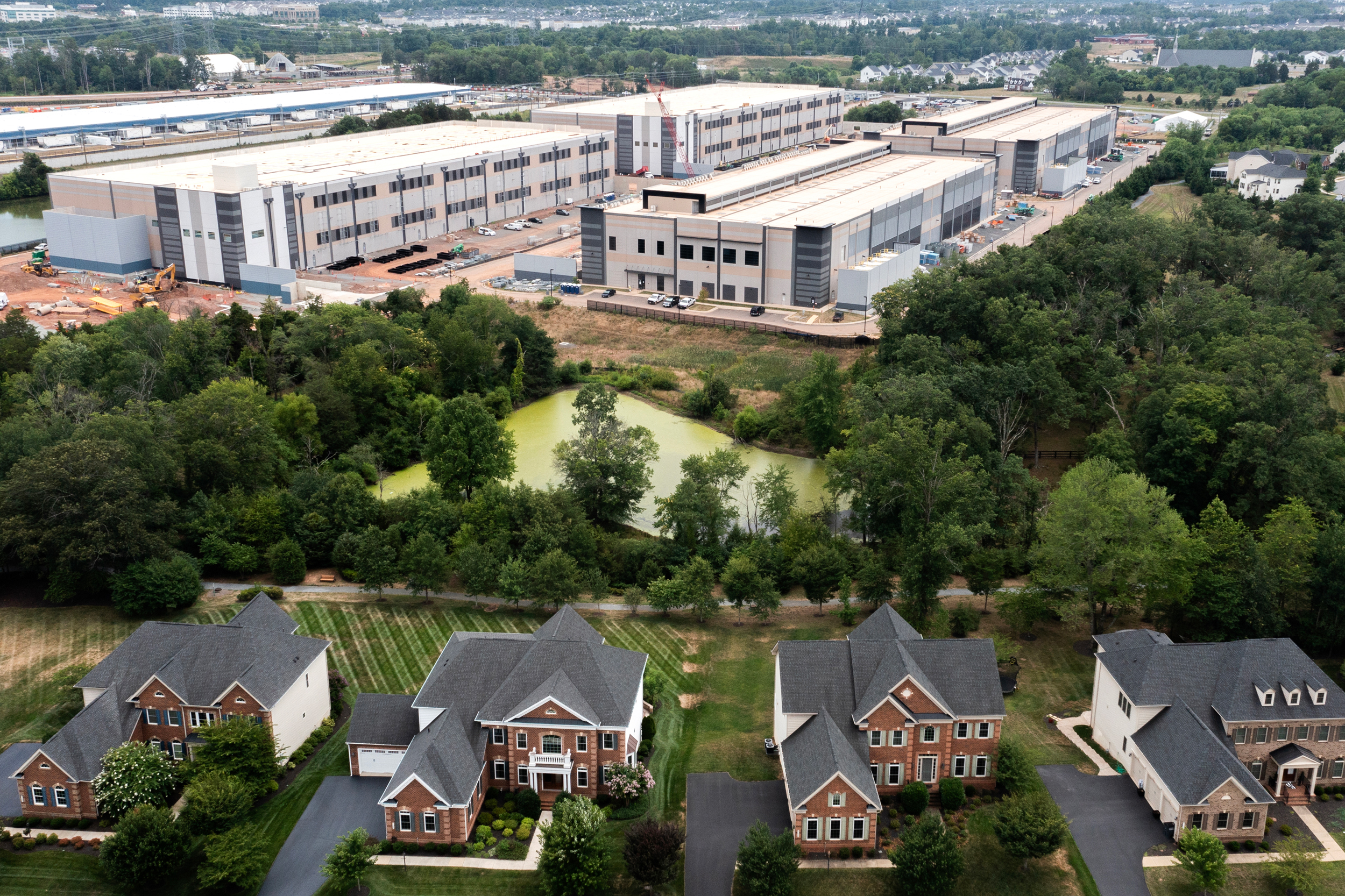

Data centers, the massive warehouses with the computers powering the internet and artificial intelligence, require massive amounts of electricity and water to run and stay cool. The industry has brought tax revenue and jobs, especially in construction, but some localities in Northern Virginia are passing tighter siting rules limiting future development as they pop up near homes.
Still, a plethora of proposed new data center facilities have already requested service from Dominion Energy, Virginia’s largest utility, and rural communities are eyeing their economic development.
In regulatory filings, Dominion has said that data centers are the main driver of an expected increase in total customer demand from 17,300 megawatts last year to 26,600 megawatts by 2039. The same planning document found that grid upgrades to meet that demand could increase a typical residential monthly bill over that same period from $142.77 to $214.24.
Along with potential new rules to increase requirements for data center zoning, tweaks to the Virginia Clean Economy Act are expected to come up in the next legislative session starting in January. So far, Democratic legislative members have been unwilling to give up the 2050 fossil-fuel retirement target in the face of surging electricity needs for data centers, which the Trump administration wants to power with fossil fuels.
In order to keep carbon-emitting resources online under the VCEA, Dominion and Appalachian Power must prove a need to ensure grid reliability and meet energy efficiency standards.
Dominion Energy and Appalachian Power have so far satisfied the gradually increasing requirements to use renewable energy, but Youngkin says the policy is creating electricity shortfalls. Dominion has also proposed bringing online a new natural gas “peaker plant” in Chesterfield County in 2029 to prevent any shortfalls in electricity in periods of peak demand.
Solar and wind power are now typically cheaper than oil, gas and coal. But critics of solar and wind power say they can’t be built fast enough and aren’t reliable if there is no sun or wind.
Environmentalists and ratepayer advocates say battery storage can address that issue.
“Once we have solar panels in every parking lot and rooftop and have maxed out the deployment of new, innovative non-emission technologies, only then can we say, let’s examine this question, if we actually need some horribly expensive polluting fossil fuels on the grid as well,” said Brennan Gilmore, executive director of Clean Virginia, the advocacy group created by Charlottesville millionaire Michael Bills. “But we are very far from that in Virginia.”
This story is funded by readers like you.
Our nonprofit newsroom provides award-winning climate coverage free of charge and advertising. We rely on donations from readers like you to keep going. Please donate now to support our work.
Donate Now
Throughout the election, Democrats in the legislature have said they are hopeful that a Spanberger win will enable them to pass legislation controlling data center development that won’t get watered down by leadership, or vetoed, as happened under Youngkin. They also want to pass the legislation increasing small solar projects and battery storage that Youngkin vetoed.
“We want technology to be able to move forward, absolutely, but we’ve got to be able to make sure that [consumers] aren’t disproportionately having to pay for that and we want to do it in a responsible way. It’s about that balance between the two,” said Leslie Mehta, a Democrat backed by Clean Virginia running for an assembly seat in Chesterfield County outside Richmond. “In Chesterfield, there is the gas plant that’s really big. We need to be moving forward towards having alternatives, and we’re not really doing that if we’re focusing on having a new gas plant that’s going to be built in the near future.”
Youngkin has consistently lambasted the VCEA, and his appointed Virginia Energy director has cited a figure for increasing costs under the law that is disputed. House Minority Leader Terry Kilgore, a Republican seeking re-election in a deep red Southwest Virginia district, has previously supported data centers to provide economic development. Last week, he reiterated an “all-of-the-above” approach to energy development that includes fossil fuel use, nuclear and renewables.
“Energy policy has been a big debate. Folks want to make sure that they have lower electric bills and that when they go to their light switch, it turns on,” said Kilgore, a Dominion-backed candidate. “The VCEA, there’s going to have to be amendments to it. The folks who know energy are going to sit down and try to figure out what makes sense for Virginia, what makes sense to make sure the lights come on and stay on.”
The Funding
What’s unclear is exactly how Democrats will act with their trifecta control, if they get it.
Spanberger has said she’s watching what the State Corporation Commission, the state’s utility regulator, decides later this year on Dominion’s proposal to divide up increasing grid costs among data centers and other customers. She’s also been critical of new fossil fuel infrastructure, but it remains to be seen whether she softens her opposition.
How progressive Democrats backed by Clean Virginia interact with Democratic legislative leaders, with Spanberger as governor, also remains to be seen. House Speaker Don Scott, (D-Portsmouth), and Sen. President Pro Tempore Louise Lucas (D-Portsmouth) are backed by Dominion.
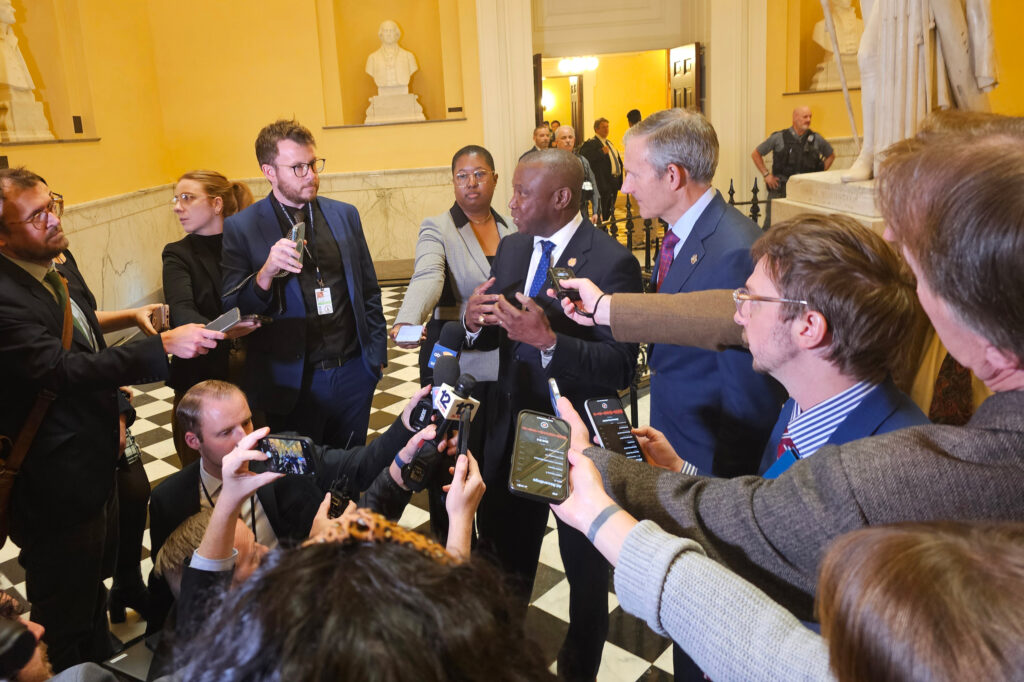

Data centers account for about 27 percent of Dominion’s electricity sales, and the utility is proposing the new $1.47 billion gas plant in Chesterfield County that could come with a 9.7 percent profit margin granted by the State Corporation Commission. Scott has previously said he favors tweaking the VCEA to provide some leeway in meeting decarbonization targets. Both he and Lucas declined to answer when asked at a redistricting effort last week about their support for modifying the law.
“I know that it will come up. In what iteration I don’t know,” state Sen. Mamie Locke, chair of the Senate Democratic Caucus, said at the rally.
Dominion, the data center industry and labor groups have donated to Scott, the House speaker, and to Democratic political actions committees.
But with groups like Clean Virginia and the League of Conservation Voters donating directly to Spanberger and legislative Democrats, tension on Virginia’s future energy policy is heightened: Democrats backed by the utility could end up disagreeing with their progressive colleagues about the need for more fossil fuel power generation—and possibly clashing with Spanberger as well.
Dominion, in a statement, said it has contributed to candidates of both parties in “support of bipartisan public policy.”
“We will continue advancing Virginia’s all of the above approach to reliably serve the growing needs of our customers,” said Dominion spokesperson Aaron Ruby. “We will also remain focused on keeping our prices affordable, delivering more value for our customers, and making sure data centers pay their fair share.”
Gilmore, with Clean Virginia, said House and Senate leaders have been “good partners of Clean Virginia in a lot of ways. But there’s no question accepting utility money influences the views of legislators on these issues.”
“I would expect that they would recognize that the tide is turning on these issues with costs rapidly increasing for constituents, for consumers of these utilities,” Gilmore said. “It’s important that representatives put consumer interests first, and that includes on the question of taking utility money.”
About This Story
Perhaps you noticed: This story, like all the news we publish, is free to read. That’s because Inside Climate News is a 501c3 nonprofit organization. We do not charge a subscription fee, lock our news behind a paywall, or clutter our website with ads. We make our news on climate and the environment freely available to you and anyone who wants it.
That’s not all. We also share our news for free with scores of other media organizations around the country. Many of them can’t afford to do environmental journalism of their own. We’ve built bureaus from coast to coast to report local stories, collaborate with local newsrooms and co-publish articles so that this vital work is shared as widely as possible.
Two of us launched ICN in 2007. Six years later we earned a Pulitzer Prize for National Reporting, and now we run the oldest and largest dedicated climate newsroom in the nation. We tell the story in all its complexity. We hold polluters accountable. We expose environmental injustice. We debunk misinformation. We scrutinize solutions and inspire action.
Donations from readers like you fund every aspect of what we do. If you don’t already, will you support our ongoing work, our reporting on the biggest crisis facing our planet, and help us reach even more readers in more places?
Please take a moment to make a tax-deductible donation. Every one of them makes a difference.
Thank you,






